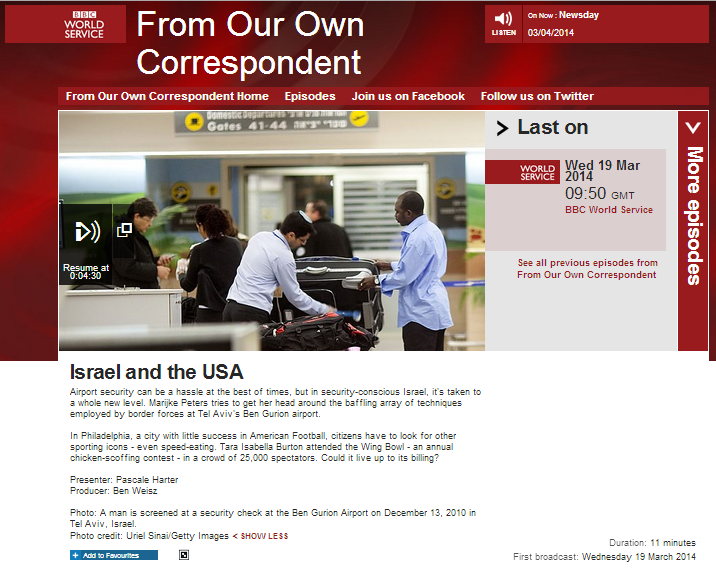Let’s be honest; it doesn’t take much talent – journalistic or otherwise – to come up with a gratuitous overly dramatic scare story about Israel and one particularly easy option for those not inclined to put any degree of real effort into their Middle East reporting is the topic of airport security.
Just such a vacuous item was broadcast on March 19th in the BBC World Service edition of ‘From Our Own Correspondent’ – available here. But Marijke Peters also ventures beyond the trite and shoddy into something bordering the world of self-centered paranoid conspiracy theory. And yet for some reason the BBC World Service considered Peters’ unqualified slurs and unsourced anecdotes worthy of broadcast to millions around the globe in a programme which purports to bring audiences “insight, wit and analysis”. 
The item is introduced by presenter Pascal Harter.
PH: “Airport security – it’s a hassle, isn’t it, at the best of times. Did you remember your passport? Have you decanted your shampoo into a smaller bottle? Have you sealed that bottle in a see-through plastic bag? Now go back through, removing your shoes and your belt, and putting your dignity in a separate tray. Passing through security in Israel though is in another league altogether, says Marijke Peters.”
[all emphasis added]
MP: “Whether it’s excessive questioning or having your computer confiscated then sent off for checks, every foreigner living in the West Bank’s got a scare story about Tel Aviv’s Ben Gurion airport. And then there are what I call the secret codes. They say the worst is a five; the first of a series of numbers stamped on a bar code stuck to your passport by a security guard that determines whether you spend the next few hours in duty-free or a dingy back room. Is the ‘one’ really for settlers? And should you actually consider the highest number – a six – a blessing in disguise because it means you’re seen as such a security risk you’ll be personally escorted onto the plane?
Requests made through the airport’s press office are an exercise in patience. My questions are met with more questions and I hang up with even less idea if there really is a system or if it’s all in my imagination. I try asking the people who hand the stickers out, pointing at the mathematical Pi symbol preceding the numbers, asking the woman if it’s specifically for journalists. She laughs; no it’s just a random sign the computer generates she says. It changes every month – doesn’t mean anything. I double-check, remembering I’ve had the same sign every time on recent trips. She walks off with my passport to ask her superior. I start to worry. A burly man in a suit walks towards me shaking his head, then assures me again the codes are all random and I shouldn’t read too much into them, suggesting perhaps now I’d like to stop holding up the other passengers. Of course all this insistence makes me even more suspicious.”
Peters goes on to make interesting – and inaccurate – use of the word ‘occasional’; defined as meaning “occurring or appearing at irregular or infrequent intervals”.
“Israel’s notoriously strict on security and Ben Gurion is no exception. The ongoing threat of terrorism gives the country cause to take safety seriously. Occasional attacks by Palestinians are a reminder that violence is still a real concern. And yes; this is the Middle East where border controls are bad at the best of times. But here the intimidation is cranked up to a level that’s kind of Kafkaesque, which makes you wonder what it’s all about.
I’ve had my hair ruffled by a female guard – presumably to check I wasn’t hiding anything dangerous in it. Another ran her fingers inside the waistband of my underwear – just enough to make me uncomfortable without making me get naked. Because that happens too. One former colleague jokes he gets the marigold treatment every time he travels here – a reference to the yellow rubber gloves worn for strip searches. Plenty of people I know have had the crotch of their boxer shorts swabbed. Things go missing; a friend’s plastic Kindle case was sent on a separate flight. Jars of Marmite are regularly bomb-tested. Foreigners who work illegally in the West Bank on tourist visas memorise fake addresses in Israel, spending hours getting their story straight.”
The majority of BBC World Service listeners will of course be unaware that “foreigners who work illegally in the West Bank on tourist visas” are frequently connected to groups such as the ISM which have connections to terrorist organisations and of course Peters makes no attempt to enlighten listeners with that fact. She concludes:
“But occasionally you steel yourself for a grilling and are greeted with a smile instead – all that pre-flight anxiety proving totally pointless. And as you’re waved out with little more than a shrug you wonder how you managed to avoid the naughty corner this time. And while the experts devote hours to debating how the system works then devising cunning plans to cheat it, perhaps, we conclude, there’s no real point. Because whether you sail through in seconds or have every last bit of luggage pored over, you almost always make the plane.
The question’s really whether you’ll feel like coming back and running the risk of enduring what’s probably just one big mind-game all over again.”
Pascal Harter closes:
PH: “Marijke Peters – still wondering what those numbers really say about her.”
Well, Peters has already been repeatedly told that they mean nothing, but that hasn’t stopped the BBC from indulging and amplifying her puerile paranoid speculations and self-obsessed whining about a system aimed solely at saving lives (a topic which clearly interests her a lot less than the fate of her Marmite), all with the glaringly obvious aim of producing a self-serving instant item which plays to the gallery of prejudice and pre-conceived ideas.
Listeners may have learned nothing from this item about security at Israel’s main airport, but they have certainly gained a lot of insight into the dubious editorial considerations at ‘From Our Own Correspondent’.
Related Articles:



